Scenes from Armenian genocide 100th anniversary
Ethnic Armenians worldwide marked the 100th anniversary of a genocide at the hands of Ottoman Turks that claimed the lives of about 1.2 million Armenians from 1915 to 1918. The Turkish government continues to dispute that a genocide happened, and Armenian Americans are frustrated that President Obama did not use the word "genocide" this week to refer to the massacre. More than 130,000 commemorated the centennial in Los Angeles with a march on Friday.
Crowd estimated at 130,000+
Local politicians speak to the crowd
Turkish consulate general: 'We do not deny the suffering of the Armenians'
Raife Gülru Gezer, the Turkish consulate general in Los Angeles, spoke out about the Armenian genocide in an interview on KTLA-TV Channel 5 on Friday afternoon.
"We do not deny the suffering of the Armenians and we do not deny the fact that hundreds of thousands of Armenians did die during the First World War,” she added.
But genocide is a “legal term” that is being “used loosely,” she said.
Gezer also challenged the number of victims, 1.5 million, that is cited by many Armenians. She said there were not that many Armenians living in the territory in question.
"The number is debatable, frankly speaking," she said.
--Howard Blume
After chants, a song for Armenia's heroes
Thousands of people marched down Wilshire Boulevard, waving flags and chanting "shame on Turkey."
The crowd stopped in front of a stage, where a man sang to the crowd in Armenian.
"It's a hail to our heroes," said Argishe Minasyan, a Glendale resident.
"We love all of L.A. taking action," he said. "We appreciate everyone here."
--Brittny Mejia
Traffic stemming from march riles up residents
March takes route to Turkish consulate
The procession that continued Friday afternoon along a six-mile route, beginning in Little Armenia and ending at the Turkish consulate, was multi-generational, with small children riding atop parents' shoulders and older women linking arms for balance as they moved forward.
Morning traffic was especially bad on the 101 Freeway on Friday between the San Fernando Valley and downtown, possibly due to the events, according to the California Highway Patrol.
The march is scheduled to officially conclude at 6 p.m.
--Brittny Mejia and Taylor Goldenstein
'Resilience pays off'
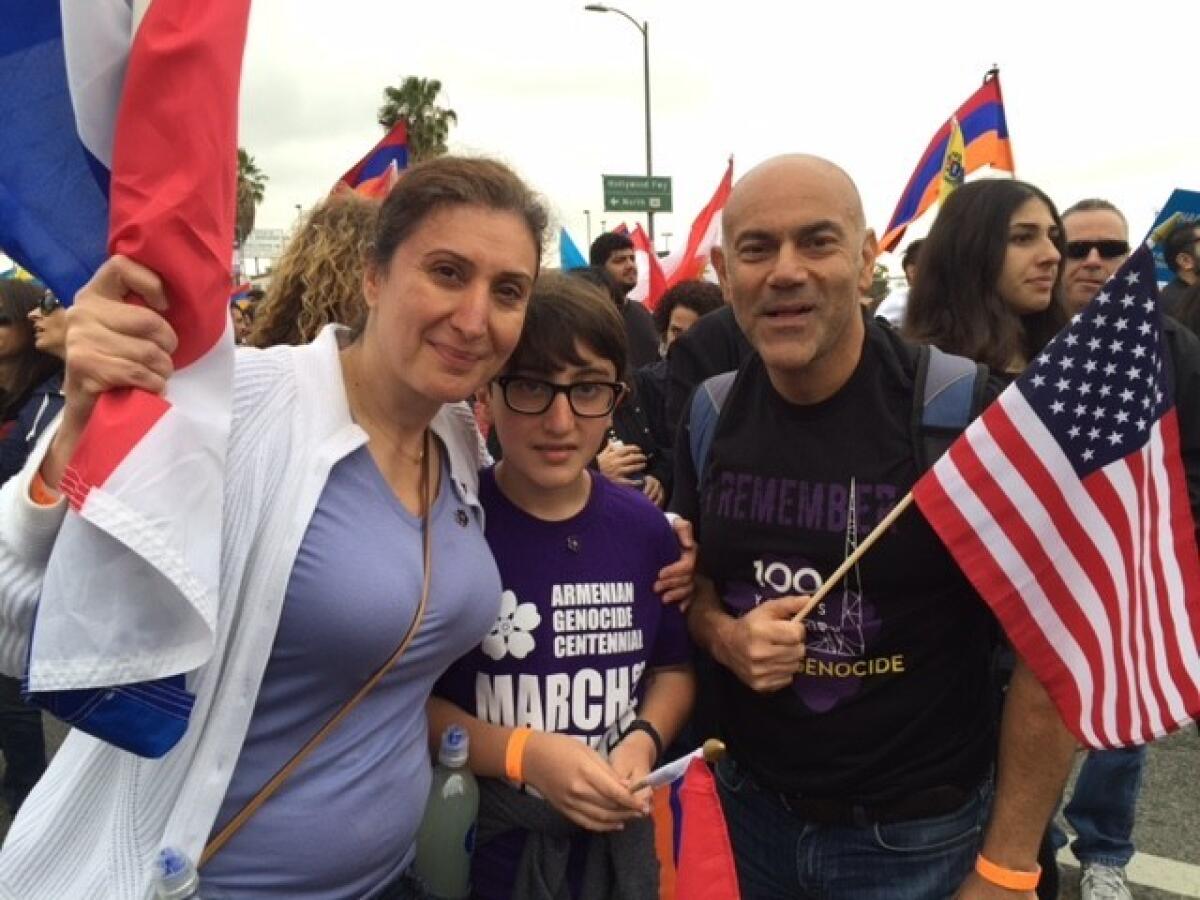
Taylor Goldenstein / Los Angeles Times
Pasadena resident Sophie Jihanian, 48, holding a large French flag with a small Armenian flag stuck in the top, put her left hand to her mouth and led a chant in Armenian at the Hollywood Armenian genocide anniversary march.
"Barkar minchev verch!" she yelled, which translates as "Resilience pays off."
Her husband, Cedrik, whose family immigrated to France, said the lack of Turkish recognition has prevented him and many others from healing.
Sophie Jihanian said she's fighting not only for the rights of her people: "We also believe tremendously that this will help all genocides in the world be eradicated for all people. Had it been recognized, perhaps we wouldn't have had the Holocaust."
--Taylor Goldenstein
'They buried us but did not know we were seeds'
Scenes from the Los Angeles march
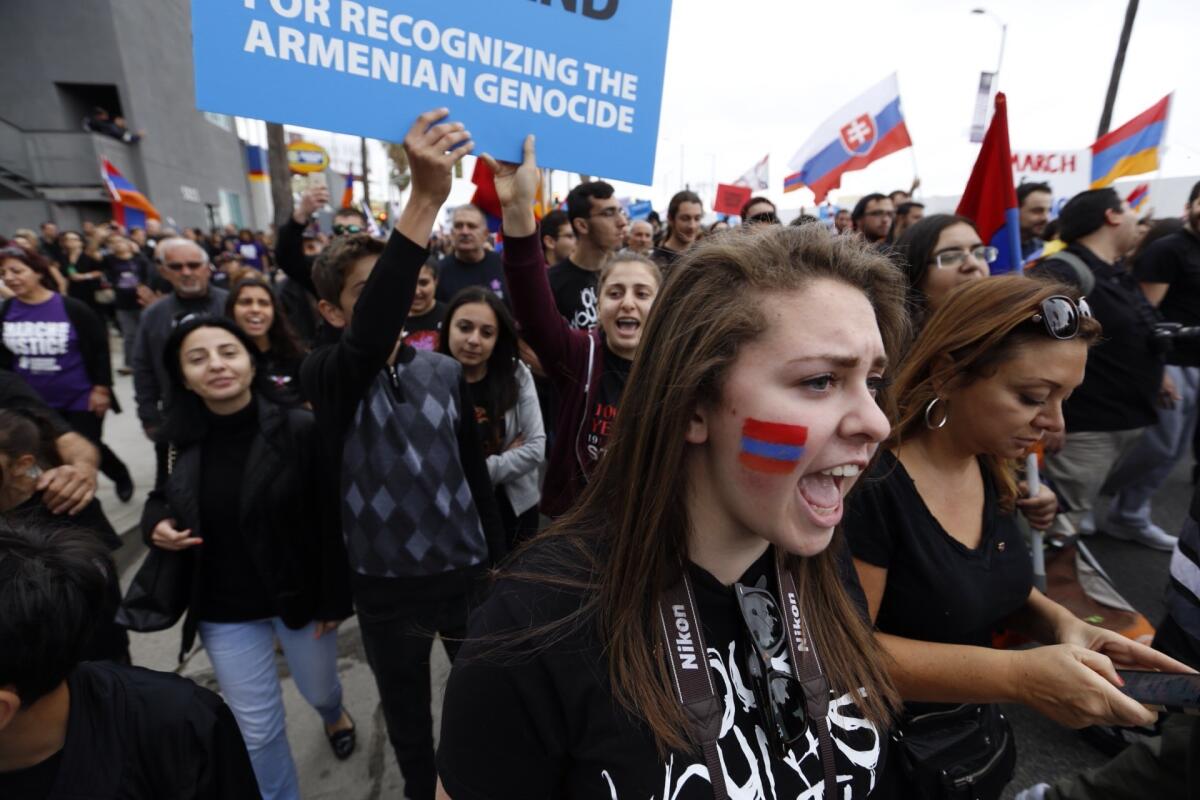
Shannon Blanck, right, chants as thousands march west on Sunset Blvd. at the beginning of a six mile march marking 100th anniversary of Armenian Genocide by Ottoman Turkish government.
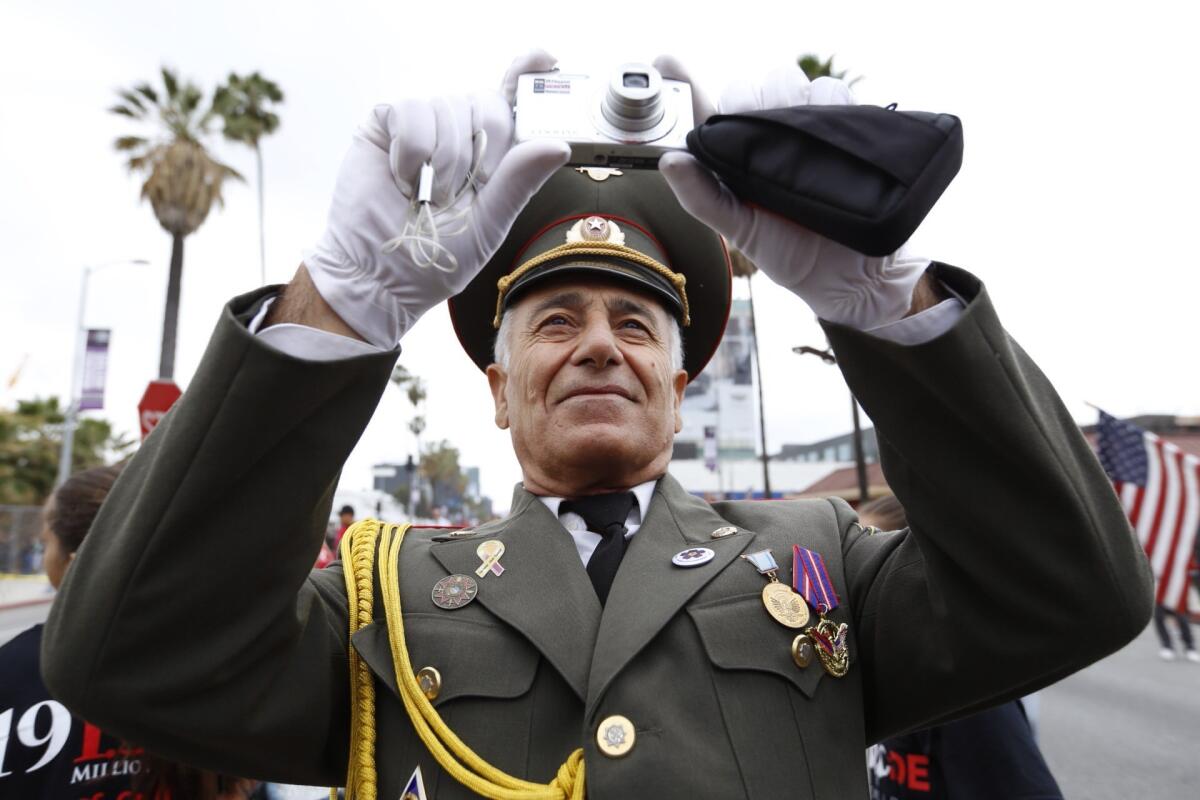
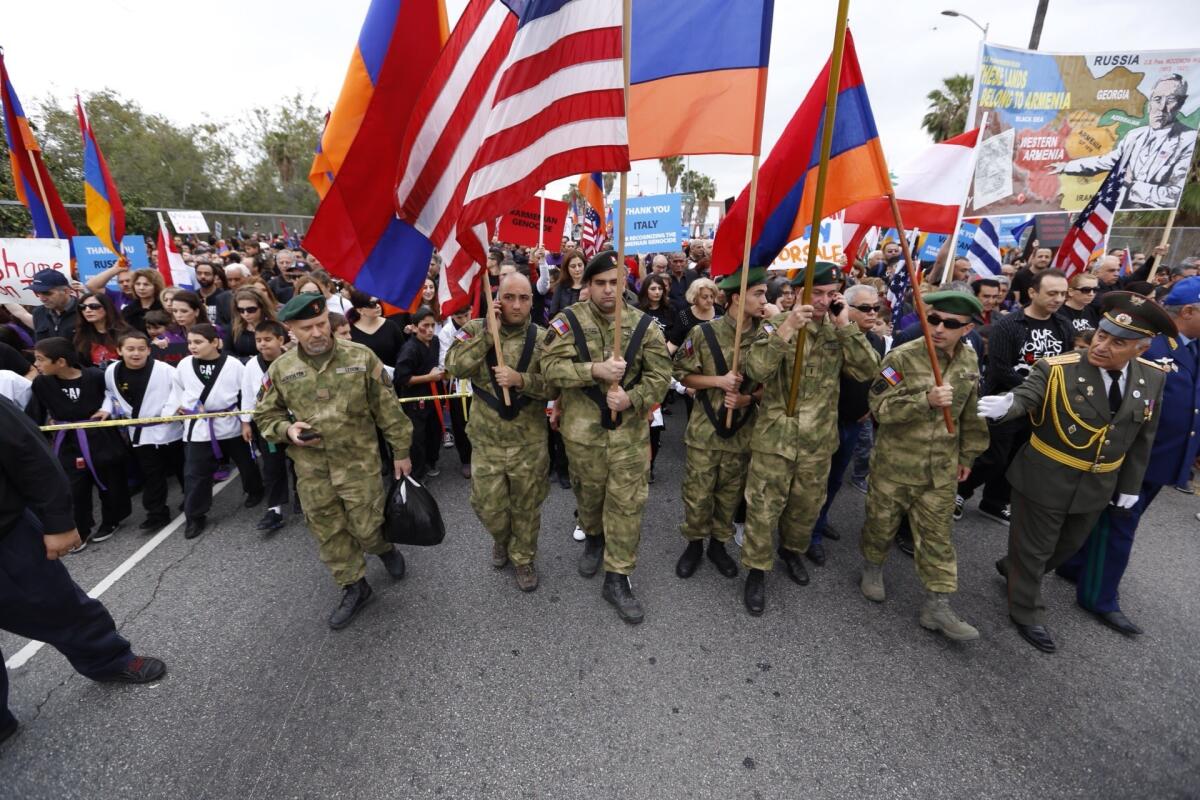
Photos by Al Seib / Los Angeles Times
Signs of support for the crowd
Jerusalem bells ring 100 times; protesters gather
Churches across Jerusalem rang their bells 100 times before ecumenical services Friday at the Church of the Holy Sepulchre to mark the 100th anniversary of the Armenian genocide.
For the first time, Christian churches of various denominations in East Jerusalem joined their Armenian brethren in marking the anniversary of the massacre.
As well, hundreds of protesters carried the red, blue and orange Armenian flag and signs reading "Turkey guilty of genocide" at a demonstration near the Turkish consulate in East Jerusalem on Friday.
--Maher Abukhater
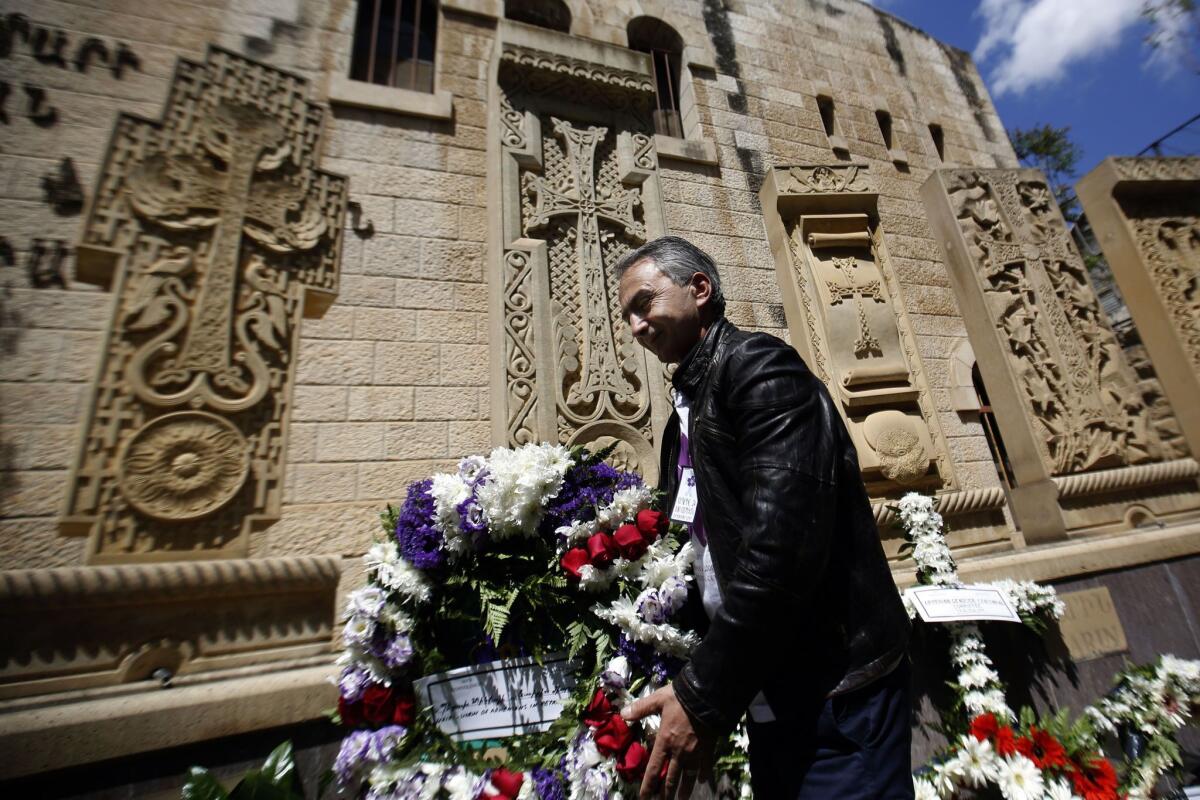
(Gali Tibbon / AFP/Getty Images)
L.A.'s archbishop: 'We stand in solidarity' with Armenians
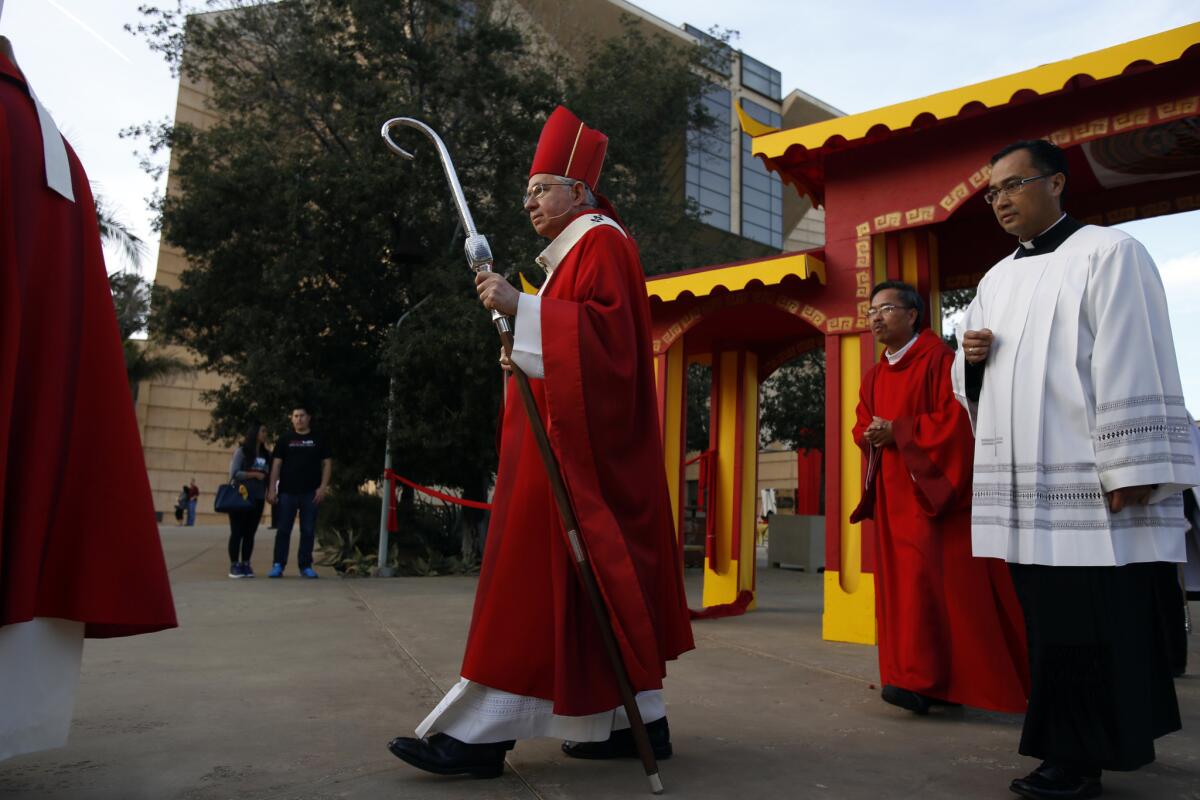
Francine Orr / Los Angeles Times
Archbishop Jose Gomez tweeted Friday that Catholics "stand in solidarity" with the people of Armenia in Los Angeles and around the world.
The archbishop's comments echoed sentiments expressed by Pope Francis nearly two weeks ago. At an April 12 Mass at St. Peter's Basilica, the pope used the term "genocide" to describe the killings.
Turkey, which has denied the massacre was a genocide, responded by recalling its ambassador to the Vatican.
--Christine Mai-Duc
In Tehran, a march from church to embassy
Thousands of Iranian Armenians rallied in Tehran on Friday, protesting in front of the Turkish Embassy to commemorate the 100th anniversary of the Armenian genocide.
Many in the crowd, who marched from the Armenian church in Tehran to the Turkish Embassy, held signs in Farsi and English asking the international community to recognize the genocide, while others chanted slogans calling for justice and the downfall of the Turkish government.
“What Armenians demand now is that the Turkish government recognize [the massacre] as genocide and accept its legal consequences,” Karen Khanlari told Iran's Press TV during the protests.
--Sarah Parvini
Bittersweet mood during march
People at Friday's Armenian genocide memorial dedication and march in Hollywood were happy about the sense of community, yet sad about what the 100th anniversary represents.
"We're commemorating their victimization 100 years ago," Josephine Camalian, 42, of Burbank said of those killed. She said her grandfather at age 8 was in an orphanage because he lost both parents.
"We're sad, this is a sad day for us. This is the blackest day of our history," she said. "We hope that our voice once heard will allow for this history to never happen to anyone else. We don't want anyone else to go through what we went through."
Some in the crowd wiped away tears as they watched the sea of Armenian flags wave as an Armenian song played.
--Brittny Mejia
Watch the march live
Obama booed by marchers
A large group of marchers gathered near a stage on Sunset Boulevard as a woman took the stage.
She called for official recognition of the Armenian massacres as a genocide, and mentioned President Obama, which prompted a chorus of boos from the audience.
"Mr. Obama, it really is time to learn the lesson of our history," she said.
--Brittny Mejia
Songs and signs along the march
As the march began, the crowd was a blur of brightly colored flags in stark contrast to the muted gray sky.
Many marchers held identical azure signs: "Thank you ___ for recognizing the Armenian genocide," and in the space was the name of a different country.
Some signs were more forceful: "We Demand Justice" and "Turkey Must Pay."
A group of people in the crowd began to chant a historical song, the sounds of their voices broken by the loud humming of helicopters overhead.
--Taylor Goldenstein
Who invented the word 'genocide'?
Writer Thomas de Waal in Foreign Affairs discusses the politics that come into play when the word "genocide" takes a seat at the table. A State Department official once told him that resolutions related to the Armenian genocide took up more discussion hours than any other congressional issues.
The word came from Polish-born Jewish lawyer Raphael Lemkin, De Waal says. He invented the word in 1944.
“I became interested in genocide because it happened so many times. It happened to the Armenians, and after the Armenians, Hitler took action.”
Families' missing pieces
Tarzana resident Anna Karapetian, 31, said her family was torn apart after the genocide, and of those who survived, some were never found. The genocide has left a scar on many families, she said.
"They're not the same," Karapetian said. "There's always a missing puzzle, a missing piece in their families as far as who they are and who they're going to be ... regardless of how many years go by."
Karapetian brought her 6-year-old daughter, Sofie Tigeranian, to the Armenian memorial dedication. Sofie proudly sported a purple forget-me-not flower and Armenian flag on her face.
Passing on her language, religion and culture is one way to ensure the tragedy won't be forgotten and future generations will know where they came from, Karapetian said.
--Taylor Goldenstein
Poetry from genocide pain
Azniv Derdzakyan, a senior at Hollywood High School, wrote a poem to commemorate the anniversary.
Here's an excerpt from the poem, posted to HS Insider, titled "Never forget":
Blood flows through my body/ It reminds me of my roots / I feel the torture / The pain that my ancestors / And many more felt
HS Insider is a digital platform started by The Times to help high school student journalists tell stories important to them and their communities.
Read the full poem by clicking below.
--Christine Mai-Duc
Never too young
Teaching the children
Some in the crowd at the Armenian Genocide Memorial Square brought their children to remind them of their history.
Steve Nersesyan, 37, came with his two kids and his niece and nephew. The kids waved flags and one was draped in the Armenian flag.
"It's important for them to know why they're here in the first place," Nersesyan said. "Armenians are scattered around the world because their homeland was taken away from them."
--Brittny Mejia
Hidden memories become a book
Elizabeth Marks, a Studio City resident, was among dozens of people gathering at Western Avenue and Hollywood Boulevard to commemorate the anniversary.
One-hundred years ago today, Marks said, her father was sent off in caravans and forced to march across the desert.
He escaped but never spoke about what happened, Marks said, but one day she found his manuscripts, describing his ordeal at age 14. Marks wrote a novel, which was published two weeks ago, she said.
--Brittny Mejia
Crowd marches down Western Avenue
Cheering the memorial square sign
The crowd cheered and clapped as each government official asked for remembrance and recognition of the genocide.
Many held phones up to capture the moment. A little girl dressed in purple sat on her father's shoulders, waving an Armenian flag as she waited for the Armenian Genocide Memorial Square signs to be unveiled. Many people chatted in Armenian, the mood a happy one. A few boys wore hats that read "1915."
--Brittny Mejia
Memorial square's sign officially unveiled
"This morning we dedicate the Armenian Genocide Memorial Square to honor those who perished during the 1915 genocide," said L.A. City Council member Mitch O'Farrell.
The square serves as a permanent reminder that Armenian culture is thriving in Los Angeles and across the world, and that the Armenian spirit will never be broken, he said.
--Brittny Mejia
Crowd gathers at memorial square
Dozens of people gathered at Western Avenue and Hollywood Boulevard, awaiting the unveiling of the Armenian Genocide Memorial Square. Many wore purple shirts that read "March for Justice Armenian Genocide Centennial." Some also carried signs reading "1915 never again."
Talar Alexanian, 22, was one of the purple-shirted attendees.
"All of us here today, we have a story. We have a connection," she said. "We're fighting for recognition of all those lives lost."
Alexanian said her great-grandfather was sent to work to dig trenches and was a survivor of the genocide.
--Brittny Mejia
1.5 million new saints
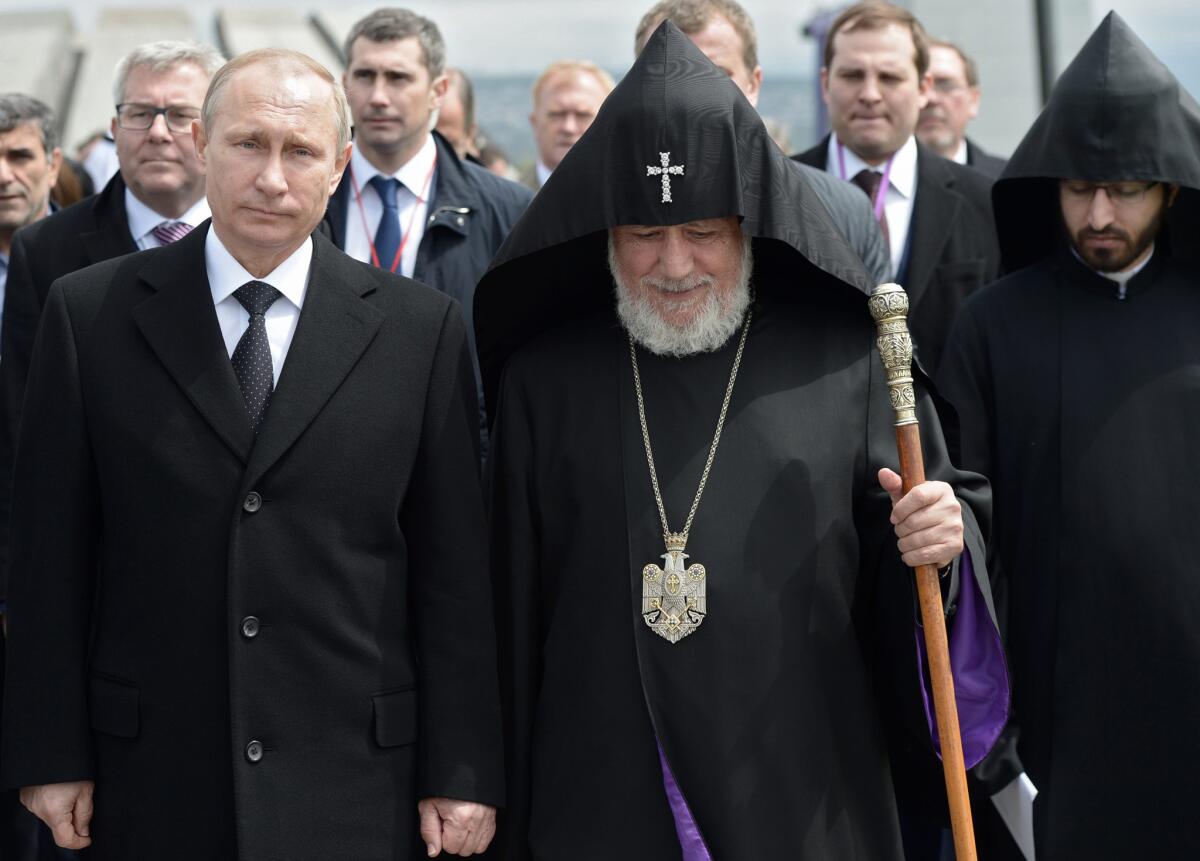
EPA
Armenia's national church honored the victims of the Ottoman Empire's massacres by canonizing them en masse as martyrs in a ceremony Thursday.
Karekin II, the head of the Armenian Apostolic Church, said that in honoring the victims, "the church only recognizes what happened: that is genocide."
Historians and other experts widely agree that at least 1 million Armenians died in the genocide; other estimates put the number closer to 1.5 million. Turkey concedes a much smaller number of deaths.
--Associated Press
Leaders of Russia and France attend ceremony in Armenia
Russia's Vladimir Putin and France's Francois Hollande were in Yerevan, Armenia, today to join other leaders in commemorating the 100th anniversary of the Armenian genocide.
Putin and Hollande each placed a single yellow rose on a wreath as part of the ceremony.
"We will never forget the tragedy that your people went through," Hollande said.
--Associated Press
'Armenian Genocide Memorial Square'
Los Angeles City Councilmen Paul Krekorian and Mitch O'Farrell are set to designate the site, at Hollywood Boulevard and Western Avenue in the Little Armenia district, the Armenian Genocide Memorial Square.
On Turkey's denial -- and censorship -- of Armenian genocide
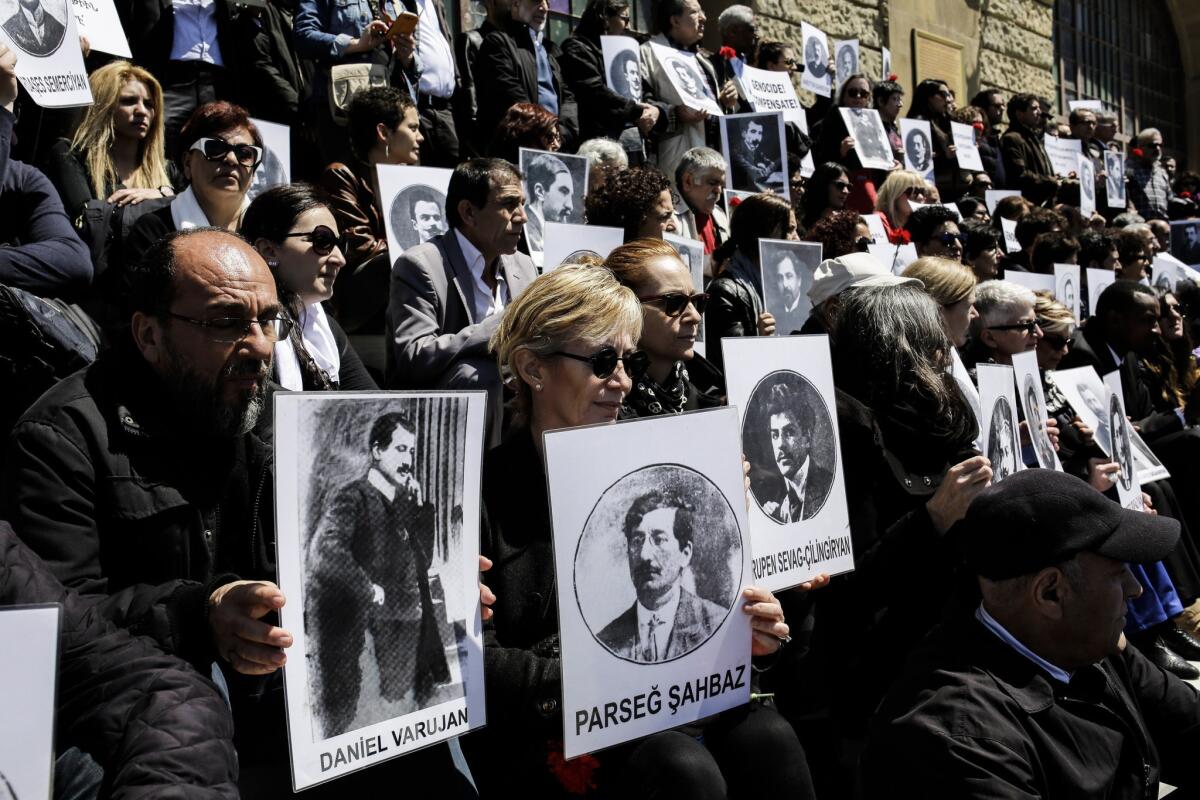
Yasin Akgul / AFP/Getty Images
Peter Balakian, Colgate University humanities professor, writes that the Turkish government has continued to lobby hard against governments and cultural events that refer to the 1915 massacre as a genocide.
Turkey has paid lobbyists to kill congressional resolutions on the genocide, and in 2012 was successful in pressuring the British government to remove the word “genocide” from an exhibit featuring Armenian painter Arshile Gorky at the Tate Gallery, Balakian wrote in an op-ed article for the Los Angeles Times.
“Substitute 'Jews' for 'Armenians' and 'German government' for Turkish government' and you can imagine the ensuing moral outrage,” Balakian wrote. “Denial of genocide is the final stage of genocide because it strives to kill the memory of the event.”
--Christine Mai-Duc
Anniversary marked in vivid demonstrations around the world
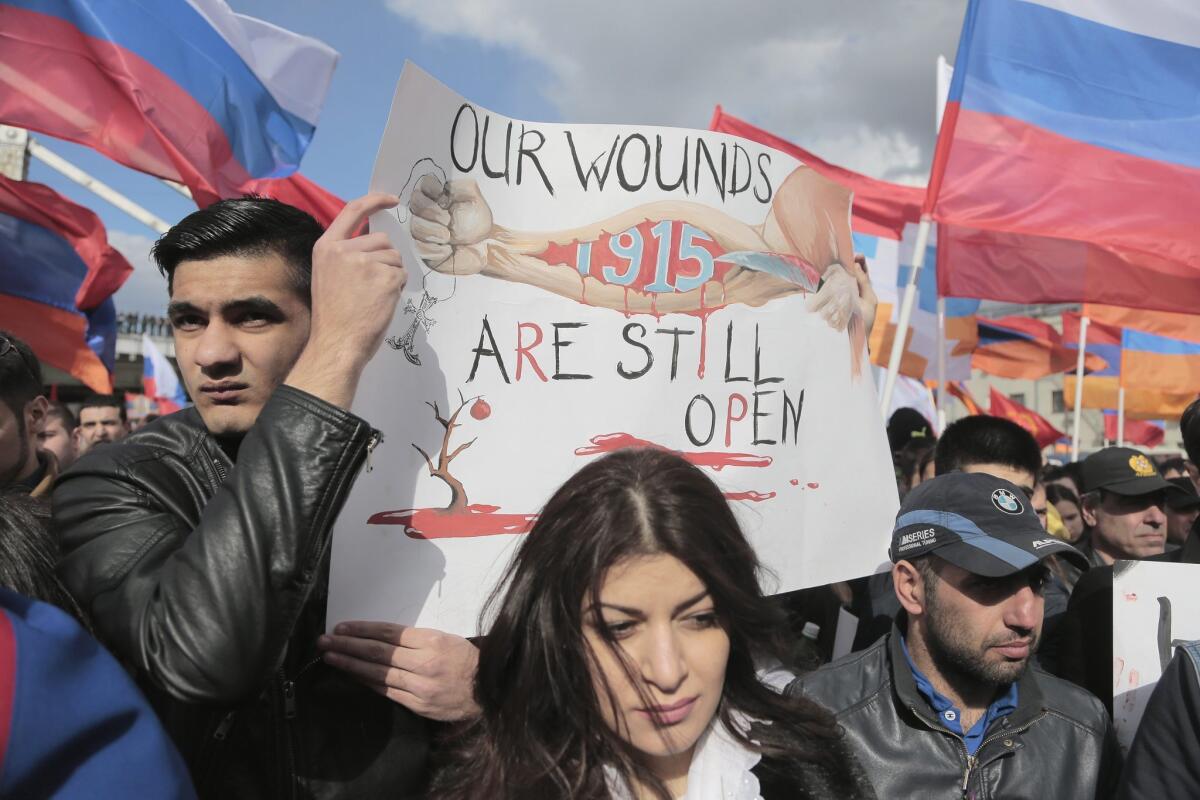
Armenian people attend a rally in Moscow to mark the 100th anniversary of the mass killings of Armenians under the Ottoman Empire.
Maxim Shipenkov / EPA
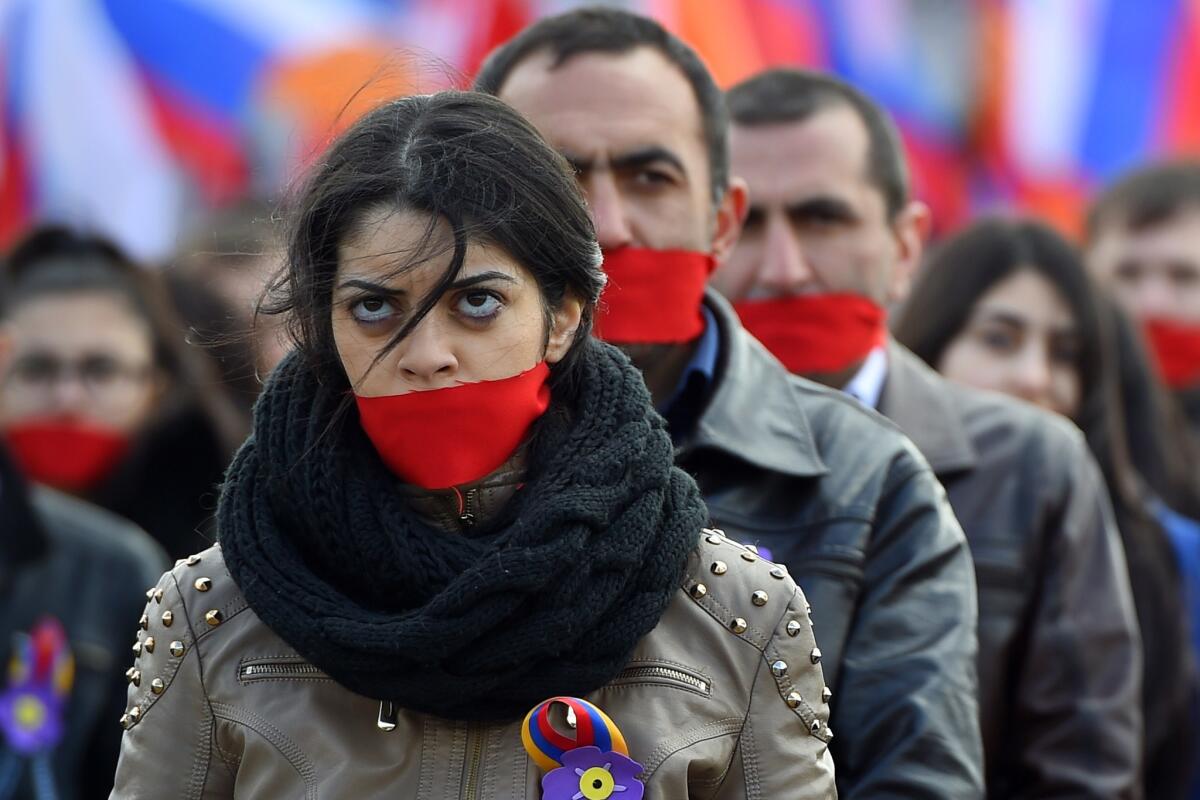
People wearing gags gather in central Moscow to mark the 100th anniversary of the Armenian genocide.
Dmitry Serebryakov / AFP / Getty Images
A commemoration in Moscow included people wearing gags to mark the 100th anniversary. See more photos from around the world at the link below.
Closing shop
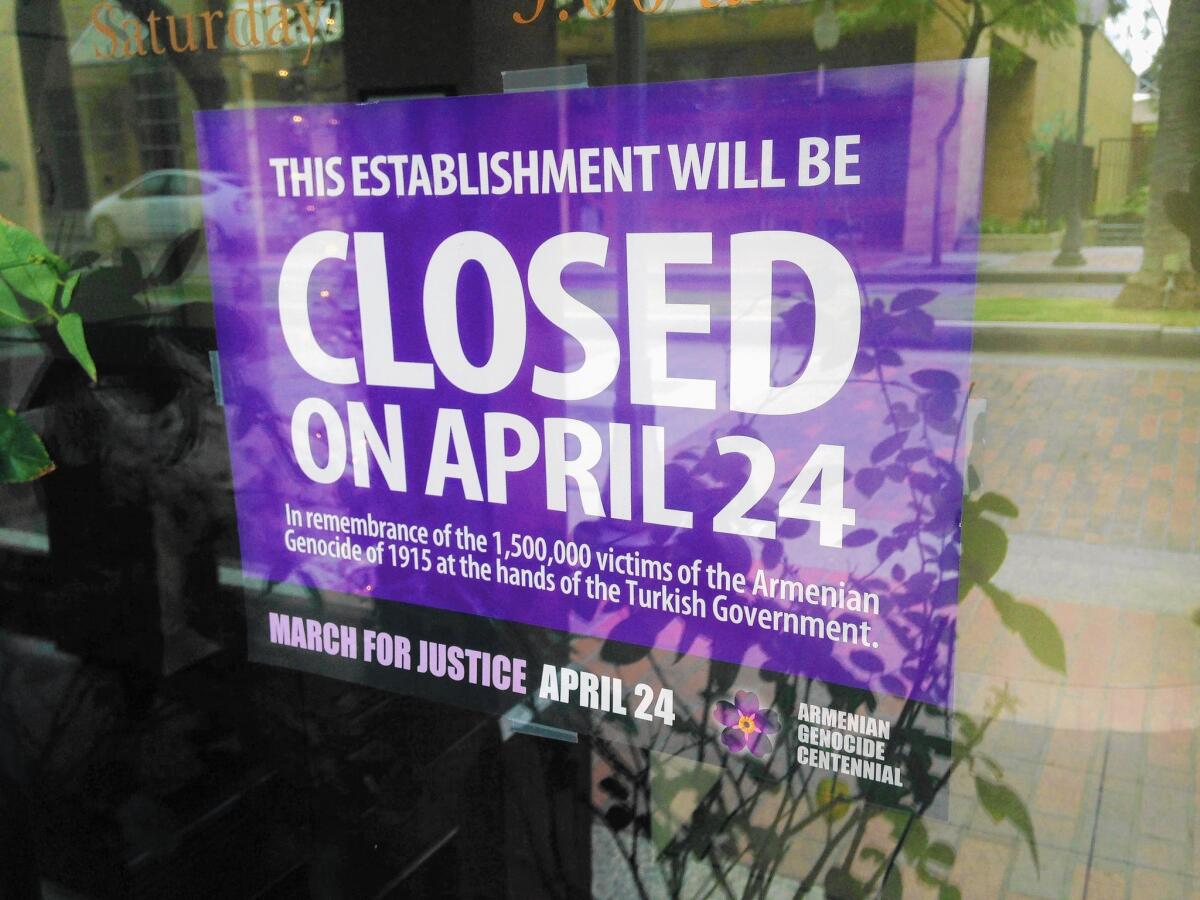
Many Armenian-owned businesses around Glendale have displayed signs in their front windows indicated they will be closed on Friday in observance of the Armenian Genocide.
Arin Mikailian / Glendale News-Press
Like many Armenian-owned shops and restaurants in the downtown Glendale area, Sevak Kouyoumjian has a sign in his window that reads "Closed on April 24." The signs tell patrons the stores, some of which rarely close, are shuttered today to mark the "1,500,000 victims of the Armenian Genocide of 1915 at hands of the Turkish government."
About 12,000 such signs were printed and distributed in Southern California by the Armenian Genocide Centennial Committee.
--Arin Mikailian
Golden State is home to largest number of Armenian Americans
California has the largest population of people of Armenian descent in the United States, according to U.S. census data, with some 236,600 Armenians living in the state. The vast majority of those, about 183,500, live in Los Angeles County, according to 2013 census data.
--Christine Mai-Duc
Marchers gathering at 8:30 a.m.
Marchers are expected to gather at the Armenian Genocide Memorial Square at Hollywood Boulevard and Western Avenue.
From there, the march will begin at 10 a.m. at Sunset Boulevard and Western Avenue and is expected to conclude at 6 p.m. in the 6300 block of Wilshire Boulevard at the Turkish Consulate General of Los Angeles.
Organizers say the march “signifies a global demand for justice by Armenians worldwide” and demand for recognition.
--Veronica Rocha
Memories of a heroic 1915 battle
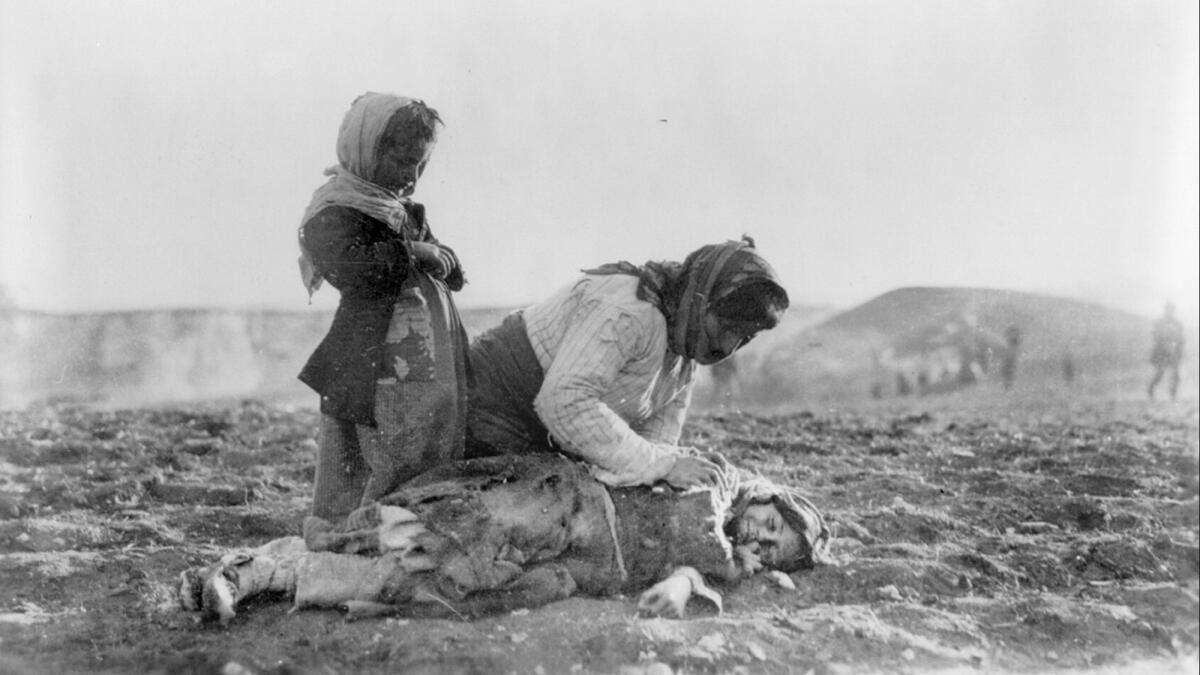
A young Armenian refugee lies dead in the fields within sight of Aleppo, Syria, in 1915.
A young Armenian refugee lies dead in the fields within sight of Aleppo, Syria, in 1915. (Unknown)
"The priest unlocks the door to a musty room, home to the ghosts of Moses Mountain, a lost place where determined townsfolk once gathered with hunting rifles and faced down an imperial army."
So writes Patrick McDonnell , who traveled to a town in Lebanon's Bekaa Valley to chronicle one of the most compelling stories of the Armenian genocide. In the summer of 1915, rather than submit to the Turks, the residents of Musa Dagh fought back. From July to September, they stood their ground. Eighteen people died in the fight.
Armenians disappointed that Obama didn't say 'genocide'
President Obama commemorated the anniversary of the massacre Thursday, but stopped short of calling it a “genocide,” disappointing many Armenian Americans.
“A full, frank and just acknowledgment of the facts is in all our interests,” Obama said in a statement released late Thursday.
White House officials defended the move as necessary to preserve a chance of cooperation with Turkey, a NATO ally, on Middle Eastern conflicts.
Armenian activists reacted with anger: Aram S. Hamparian, executive director of the Washington-based Armenian National Committee of America, called it a “betrayal of the truth,” and said it “represents a national disgrace.”
--Noah Bierman and Michael Memoli
Sign up for Essential California
The most important California stories and recommendations in your inbox every morning.
You may occasionally receive promotional content from the Los Angeles Times.







